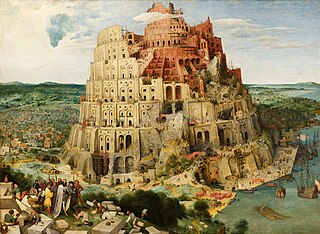Want to make a computer programmer groan? Just ask them to explain “unicode” to you and watch what happens, as all of the joy drains out of their face in an instant.
It turns out that an ancient story from one of the very earliest chapters of the Old Testament still casts a shadow over software development in the 21st Century. Which story? The account of the Tower of Babel and God’s subsequent judgement on the world – a judgement which still makes itself felt these many thousands of years later.
In the days of Noah, God recognised that the intentions of man’s heart was “only evil all the time”, and so he made a fresh start of the world, beginning again with just Noah and his family. Yet the human capacity for evil was undiminished, and it’s not long before we see the human race trying to exert their independence from God: “Come, let us build ourselves a city and a tower with its top in the heavens, and let us make a name for ourselves, lest we be dispersed over the face of the whole earth.”
In one of those verses that proves what a sense of humour God has, we read that whilst they were busy trying to build the tallest tower imaginable, reaching to the very heavens, God still found it necessary to “come down” to get a closer look at the city and the tower, which the children of man had built.
“And the Lord said, ‘Behold, they are one people, and they have all one language, and this is only the beginning of what they will do. And nothing that they propose to do will now be impossible for them.'”
It was a period of unprecedented harmony for the human race, but how did they choose to use that spirit of co-operation? To rebel against God and try to throw off his shackles, making a name for themselves. Even then, God loved us too much to leave us to this rebellion, and so he proposed a judgement fitting the crime:
“‘Come, let us go down and there confuse their language, so that they may not understand one another’s speech.’ So the Lord dispersed them from there over the face of all the earth, and they left off building the city. Therefore its name was called Babel, because there the Lord confused the language of all the earth.”
Whilst their great intention was to prevent themselves being dispersed across the face of the earth, God did the very thing that they were afraid of and caused them to divide and spread out across the earth. He muddled their languages so that the unity they had previously enjoyed was destroyed, and in its place there was misunderstanding and gobbledegook.
And that, my friends, is why software developers today still have problems making their programs handle foreign characters properly. It’s not simply that computers can’t agree on what language to speak – in many ways, English is the common tongue of most software. It’s that even when there IS agreement on the language, computers can’t even decide quite how to represent that language. As Joel on Software explains in his excellent little introduction to Unicode:
“In Unicode, a letter maps to something called a code point which is still just a theoretical concept. How that code point is represented in memory or on disk is a whole nuther story.”

The humble apostrophe causes no end of problems in even otherwise very straightforward English documents, if you use the curly kind rather than the straight line variety, since depending on the character encoding you use to save your document its codepoint could be presented in all manner of different ways: ISO-8859-1, UTF-8, UTF-16, big-endian, little-endian, blah blah blah. When you start getting in to languages with lots of accented characters like French, or even whole different alphabets such as Chinese, then it starts to get completely unmanageable unless you understand what you’re doing. And even when you understand what you’re doing, chances are you’re having to interact with libraries and services which DON’T understand what they’re doing, or which decide to handle things in an ever so slightly different manner.
So God’s curse on the sinful intentions of our hearts is still making itself felt even today. It can add all sorts of overhead when trying to get software based on different platforms to talk to each other. We’ve come a long long way from where we were a few years ago, but even so it can still cause much banging-ones-head-against-a-wall.
And so we cry, “Come, Lord Jesus!”